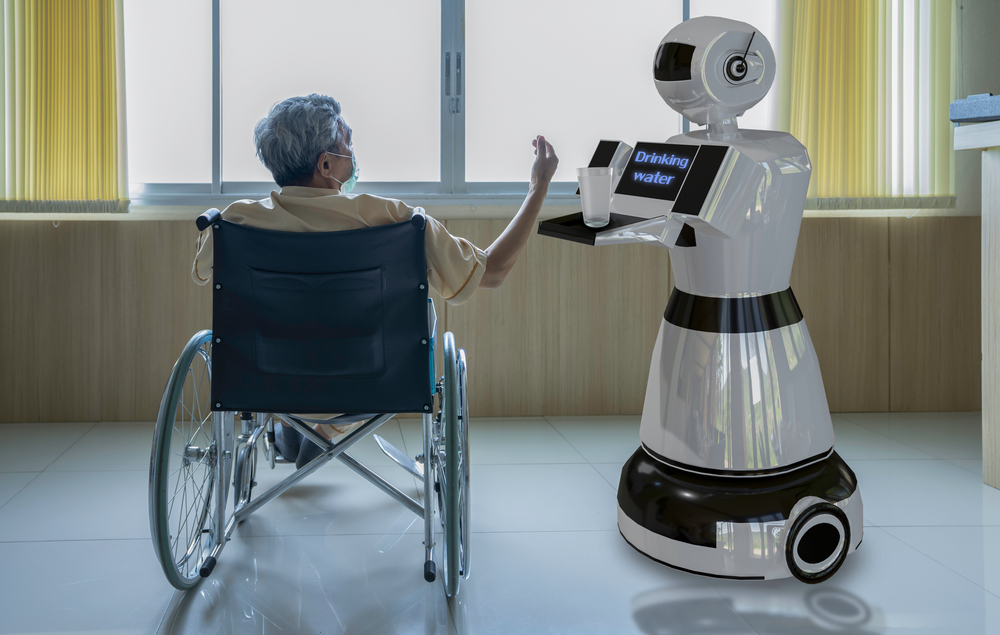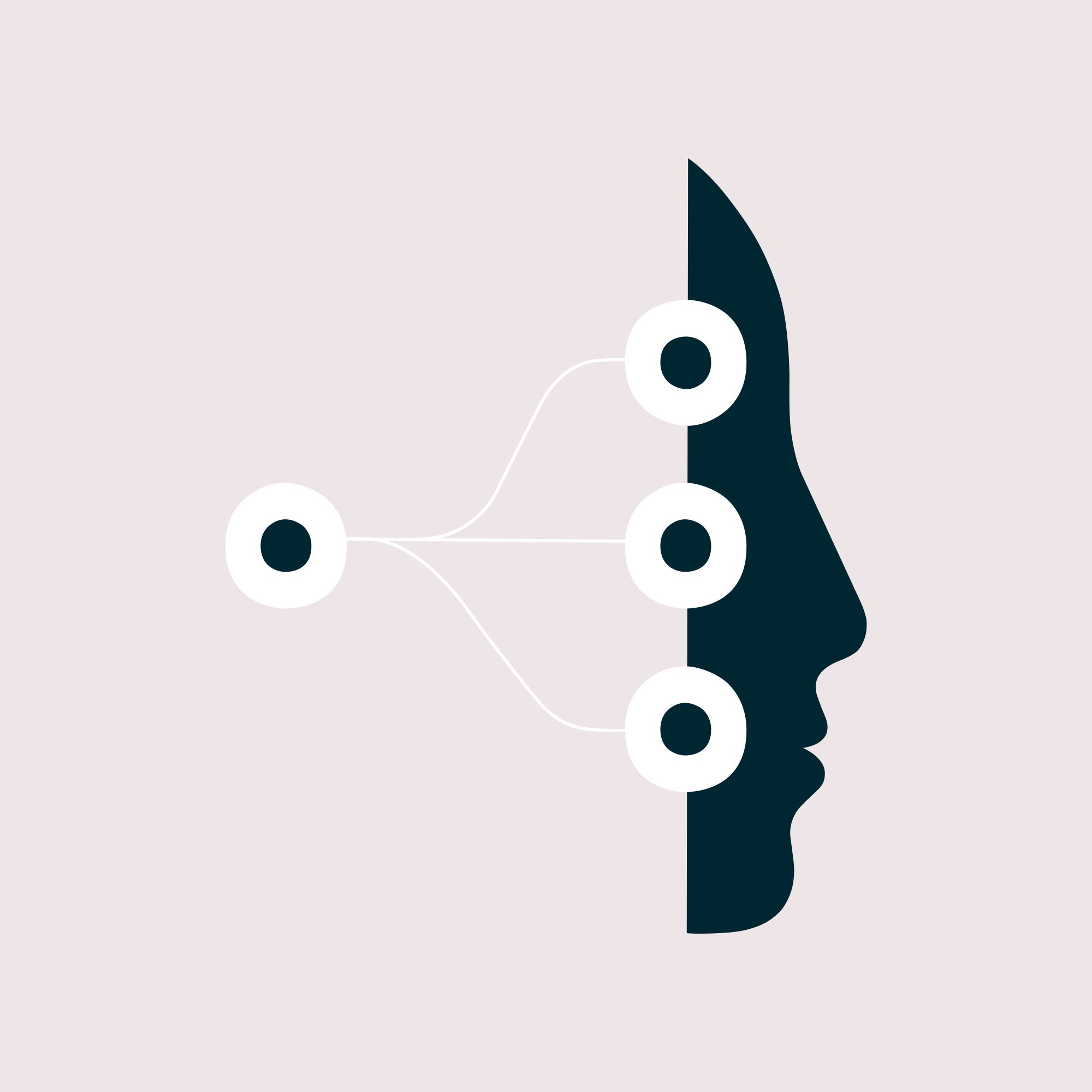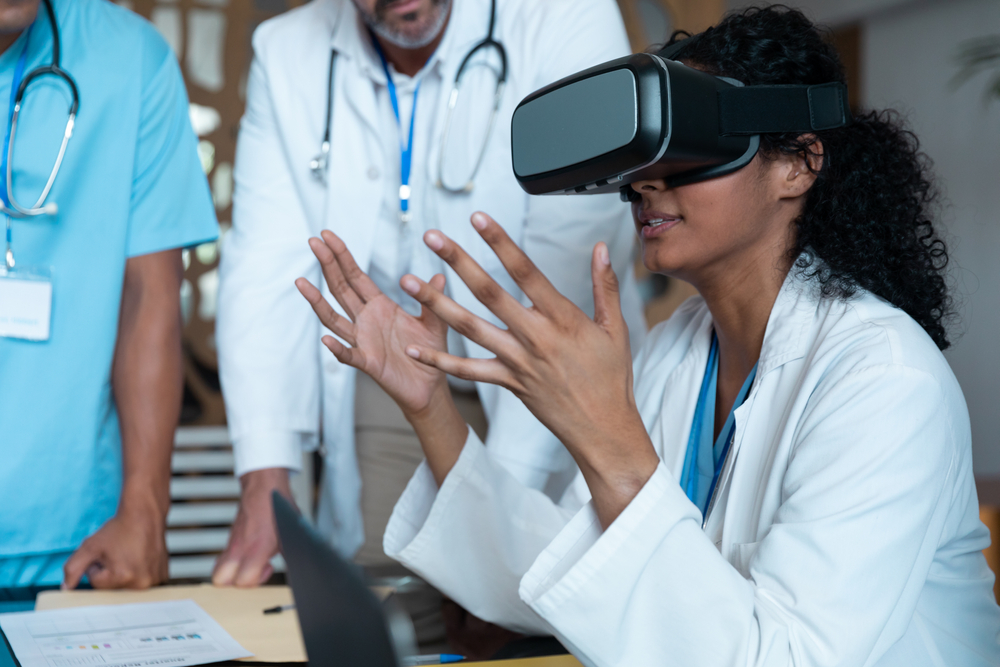
We are living in the age of a Digital Revolution, where technology is pervasive in all our lives and continues to advance at breakneck speed. Covid-19 has further accelerated its widespread use across all aspects of society, particularly in healthcare and education.
More than four billion people globally use the internet, and this number is rising. Industry has been a huge driver of rapid global change and the pace of innovation has left the healthcare sector lagging behind. Although the pandemic has accelerated more widespread adoption of digital technologies in healthcare settings (e.g., telehealth), it is largely consumers who are driving the use of mobile health technologies through the popularity of mobile phone applications (apps) and wearable devices.

Healthcare Technologies – Key Trends
In recent years, six key trends in healthcare technologies have emerged; 1. the rise of on demand healthcare; 2. the use of big data; 3. virtual (VR) and augmented reality (AR); 4. wearable devices; 5. artificial intelligence (AI) and precision healthcare and 6. robotics and social robots. These novel technologies have the capacity to completely transform the way healthcare is delivered.
The arrival of 5G technology has further created opportunities for blue-sky innovations to become a reality. For example, the use of virtual environments for robotic surgeries has already been hailed a great success and there is now potential for acute care to be delivered by first responders in contact with remote specialists by using AR glasses. Clinicians can monitor their patients remotely with technology, enabling them to collect medical data from disparate sources and make fast, reliable diagnoses.
Social Robotics
Social robots in healthcare are a growing trend as the demand for health care services far outpaces availability of staff. Evidence suggests that around 28% of a nurse’s time is wasted on low-skilled tasks that could be spent on the skilled, complex work of treating patients. Advancements in AI have enabled the programming of robots to perform a range of activities to reduce the burden on healthcare workers, with the added bonus that robots cannot contract COVID-19.
The global medical robotics market is expected to reach $12.7 billion by 2025 from an estimated $5.9 billion in 2020 at a rate of 20% per annum. Research findings using social robots have shown early promise. A recent study led by Professor Derek O’Keeffe in NUI Galway found that an android robot (DAVE) significantly increased hand hygiene behaviour by reminding people to wash their hands at the entry/exit of the hospital. The benefits of social robots are not confined to mundane tasks, studies have found that older adults may benefit from cognitive stimulation activities provided by social robots at home. Indeed, research suggests that an autonomous robot can be as effective as a human clinician in the delivery of a health education intervention and, in many cases, patients rate their interaction with robots very positively.

Digital Health
The potential for new technologies to transform the delivery of healthcare has not gone unnoticed by key global players. The World Health Organisation’s (WHO) Digital Health Strategy (2021-25) aims to improve health for everyone, everywhere by ‘accelerating the development and adoption of appropriate, accessible, person-centric digital health solutions to promote health and wellbeing’. At the centre of the European Commission’s Digital Health Strategy (2018) is the promise of a ‘user-centric’ approach to digital health transformation.
Despite the public’s enthusiasm for many of the technology toys available on the market, there has been a growing sense of unease around the capacity for our personal data to be abused, exacerbated by recent media reports on Facebook’s use of data. As we move, we leave a digital footprint, and through machine-learning, our data is being used to advertise, market and sell to us. Distrust has never been higher as we attempt to navigate life in this new technology-driven world. Research findings indicate that trust and open communication are key factors in the successful digital transformation of healthcare.

Psychology’s pivotal role
Patients are more likely to engage with technologies that have been recommended by their healthcare providers and that serve to enhance rather than replace doctor-patient communication. Evidence increasingly shows that personalisation of digital health interventions is key to widespread adoption. One-size-fits-all or generic solutions will result in lack of engagement and thus failure to achieve effective results. For most healthcare providers, a key goal is to facilitate patients to engage in positive health behaviours such as taking physical activity, medication adherence and healthy eating. Health Psychology is key to guiding the development of evidence-based digital behaviour change interventions. The challenge is to integrate psychological science with digital platforms such as apps to enable users to engage effectively with these devices, yielding long-term improvements in clinical outcomes.

Public and Patient Involvement (PPI)
It is increasingly clear that for health technologies to achieve their full potential, the need for patient and public involvement (PPI) in design and development is key. In the words of Johann von Goethe, ‘If you miss the first buttonhole, you will not succeed in buttoning up your coat’. Most popular mobile apps to date have been developed with scant understanding of human psychology or utilisation of an evidence base. Indeed, a huge gap exists between the ambitions of new technologies and their acceptability and effective use by the public. Our ‘behaviour’ is a key determinant of our health and wellbeing and understanding motivators and barriers to health behaviour is key to achieving change. In the words of Desmond Tutu: “There comes a point where we need to stop just pulling people out of the river. Some of us need to go upstream and find out why they are falling in”. To this end, the World Health Organisation has developed guidelines for the development of mobile technology declaring that stakeholder involvement is key to successful adoption.
It is evident that the rapid technology cycle far outpaces the healthcare adoption cycle, and all key stakeholders need to be active agents, not just in the implementation of innovations, but also in their design and development. Health psychology is a key player in this complex task, providing expertise on user-centred desiMOgn and guidance on motivators and barriers to behavioural change. The vision of a safe and effective digital transformation of healthcare requires a multidisciplinary approach with the patient at the centre of design. It is without doubt that as technology advances, its potential is powerful, but the impact of its application in health should be carefully monitored. To achieve success, we need to identify and develop strategies to mitigate risk to achieve a utopian, rather than dystopian future.
Profiles

Dr Jane Walsh is a Health Psychologist and Director of the Mobile Technology and Health (mHealth) Research Group where she leads a programme of research on personalised connected health. Jane leads and partners on projects worth €10 million euro, including those funded by Horizon 2020, the Health Research Board and Science Foundation Ireland. Jane is the Co-Leader of the Health and Wellbeing Cluster in the Whitaker Institute and a member of the Irish Cancer Society Research Advisory Board. She is the former Chair of the Psychological Society of Ireland (PSI) Division of Health Psychology an Associate Editor of the Journal Psychology and Health. Jane was awarded the NUI Galway President's Award for Research Excellence (2020) in recognition of her work.